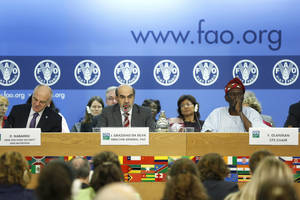 Committee on World Food Security, the world’s most important intergovernmental and multi-stakeholder platform for food security and nutrition, opened its 40th session (CFS 40) at FAO headquarters, amid urgent calls to build more effective links between international policies and the daily needs of millions of the world’s most vulnerable people.
Committee on World Food Security, the world’s most important intergovernmental and multi-stakeholder platform for food security and nutrition, opened its 40th session (CFS 40) at FAO headquarters, amid urgent calls to build more effective links between international policies and the daily needs of millions of the world’s most vulnerable people.“The latest estimates signal there are nearly 30 million less hungry people in the world in 2013, compared to last year,” said FAO Director-General José Graziano da Silva. “And we continue to progress towards achieving the Millennium Development Goal hunger target of reducing by half the proportion of the undernourished population between 1990 and 2015.”
“I see many challenges ahead of us, but also progress and successful experiences that we can build on,” Graziano da Silva added. “We are convinced that working together is the only way forward.”
“Working with a spirit of trust and mutual accountability, the multiple actors within this Committee are collaborating to address some of the thorniest issues that stand in the way of all people being able to enjoy food security,” said David Nabarro, Special Representative of the United Nations Secretary-General for Food Security and Nutrition. Key issues, said Nabarro, included “land tenure; mitigation of and adaptation to climate change; food price volatility; biofuels.”
During the week-long session, two round tables were scheduled to focus, respectively, on biofuels and food security, and investing in smallholder agriculture for food security and nutrition.
The roundtables were expected to be followed by consultations and negotiations to arrive at widely accepted policy recommendations on those issues.
“Poverty and hunger go hand-in-hand and poverty runs deepest in rural areas. Let us not forget that rural areas are a key element of any new development agenda and global food security. Let us not forget that investing in smallholder agriculture is the most cost effective way for developing countries to tackle poverty and hunger,” said Kanayo F. Nwanze, President of the International Fund for Agricultural Development (IFAD).
Other initiatives include the development of an agenda for action to address food insecurity in protracted crisis situations and the development of guidelines for responsible agricultural investments.
“The world needs a strong and effective CFS,” said Ertharin Cousin, Executive Director of the World Food Programme (WFP). “Together, we shoulder an enormous responsibility, but our burdens weigh nothing in comparison to the suffering of the 840 million chronically undernourished people depending on us to get it right.”
Hunger numbers
CFS 40 opened one week after a UN hunger report showed overall declines in undernourishment, but with mixed performance among regions and countries against the most extreme and lasting forms of food deprivation.
The report, the State of Food Insecurity in the World, estimates that 842 million people globally suffered from chronic hunger in 2011-13. This figure is down from 868 million during 2010-12, and represents a decline of 17 percent since 1990-92.
Regionally, as many as one in four persons experiencing undernourishment in sub-Saharan Africa, despite impressive improvements in some countries, while East Asia, Southeastern Asia, and Latin America saw more substantial improvements.
About 75 per cent of the world’s poorest people live in rural areas and mainly depend on agriculture for their livelihoods.
Those attending CFS 40 included agriculture ministers and deputy ministers from around the world who were in Rome to attend a separate event, the Second Ministerial Meeting on International Food Prices.
More than 30 side events dealing with a wide array of issues regarding food security and nutrition are scheduled to take place at the margins of the plenary session. The events have been set up by a number of governments and organisations, including civil society and the private sector.





